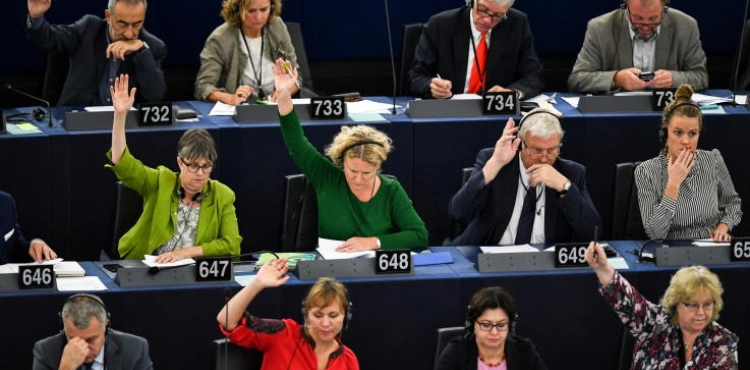Strasbourg _ Agencies
The European Parliament voted Wednesday on a resolution calling on EU Member States to apply Article 7 to Hungary to prevent the threat of "serious violation of European values."
That was the first time that the European Parliament had taken the lead on article 7, which had been taken once in the past against Poland in December 2017.
Article 7 of the Treaty of the European Union is a mechanism of the Union to guide members to implement values on which the world´s largest trading organization, including respect for freedom, democracy and the rule of law, is founded.
The European Parliament launched a move Wednesday that could lead to unprecedented political sanctions against the populist government in Hungary because it constitutes a "systemic threat" to the founding values of the European Union.
The vote is a painful political blow to the prime minister, who told the parliament on Tuesday that his government´s critical report, which led to the vote, was an insult to the honour of Hungary and its people.
Hungarian Foreign Minister Peter Gerarto criticized the vote and said that "it is nothing more than revenge for pro-immigration politicians."
With the election of a new European Parliament approaching in May 2019, the vote reflects the efforts of traditional parties in Europe to confront the emergence of populist who oppose immigration and are accused of undermining the rule of law.
The move was adopted with 448 votes in favour, 197 against, and 48 abstentions. This is the first time that Parliament has launched steps under article VII of the EU Treaty.
Yudet Sargentinian, Dutch deputy of the Green Party, who called for the vote, said she was pleased with the result, saying it was "a positive sign that this Parliament bears its responsibilities and wants to move."
She called on her colleagues not to allow Hungary to escape and said that urban "violates the values on which the EU is based."
The vote was based on a report that included concerns about judicial independence, corruption, freedom of expression, academic freedom, religious freedom, minority rights and refugees under the eight-year-old urban rule.
Voting means taking the first steps under Article VII of the European Union Treaty known in Brussels as the "nuclear option", which could deprive Hungary of its rights to vote in the European Union.
Other EU governments could stop any further steps, and Poland warned that it might do so.
In a brief speech to the parliament on Tuesday, Orban said his country would resist any attempts to "blackmail it" in order to read out its anti-immigration stance, which he said was behind the vote.
Despite his defiance, the outcome was expected and he said that it appeared that Parliament had resolved its opinion.
"Hungary will protect its borders, stop illegal immigration and defend its rights," said urban "accusing the elite of the European Union of wanting to punish Budapest for its anti-immigration stance."
The opposition to urban orientation not only comes from the left, but also from the bloc "European People´s Party " Parliamentary center-right.
Bloc leader Manfred Weber said he would vote in favor of the move aimed at the urban government.
The party spokesman said the bloc is divided by 50 to 50.
Although urban actions have aroused opposition, they are accepted by the populist in the European Union, where far-right figures put forward the idea of forming a European alliance before next year´s elections.
The European Commission, headed by Jean-Paul Yonker of the bloc´s "European People´s Party", has repeatedly faced with the urban government, especially after Budapest refused to receive asylum-seekers under a plan launched by the European Union at the height of the migration crisis in 2015.
In July last July, the European Commission warned that it could take Budapest to the European Court of Justice because of laws providing for the imprisonment of anyone who assists undocumented migrants for one year.
The court may impose fines, which are less for Budapest than the penalty for depriving it of voting rights.
Barbar Bella Heitinga, an EU human rights expert at Amnesty International, said the vote was "historic."
"The European Parliament has stood by the Hungarian people and the European Union," he said. He made it clear that human rights, the rule of law and democratic values are not negotiable. "












